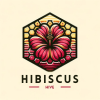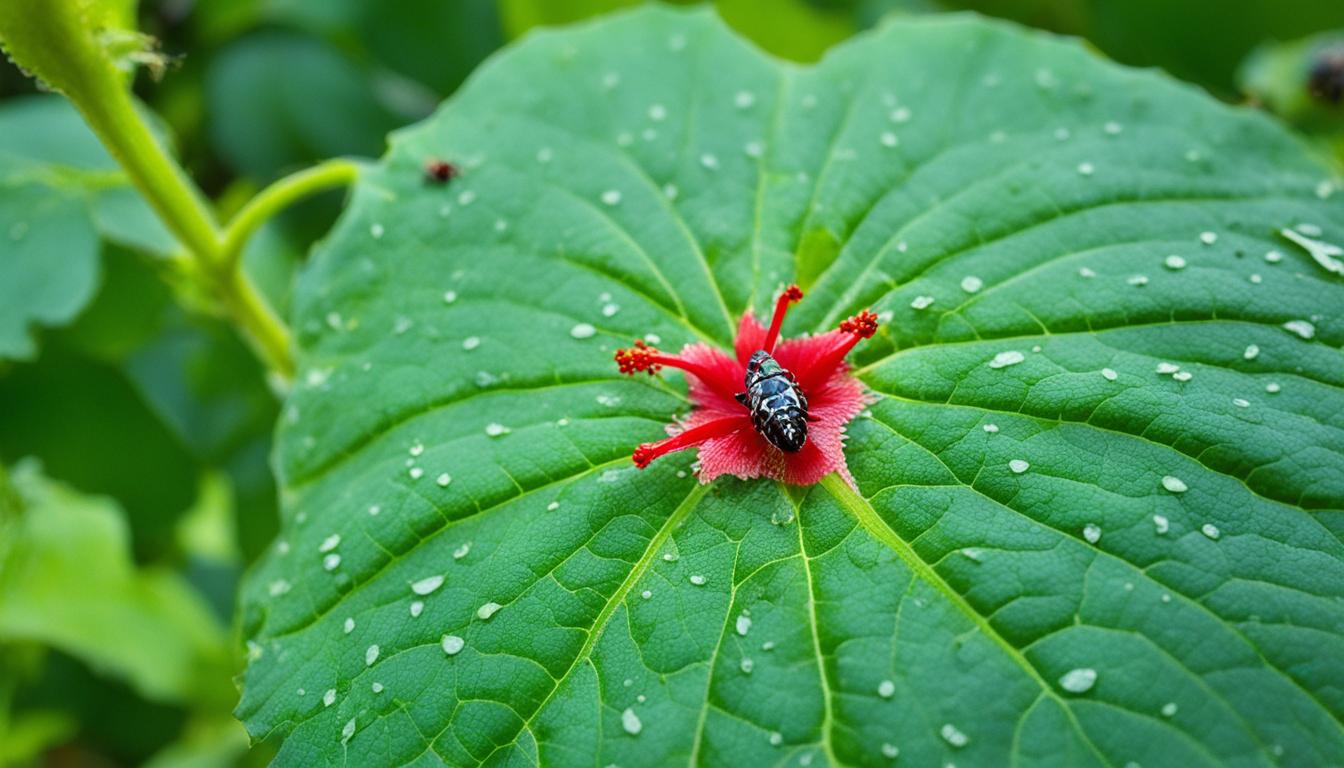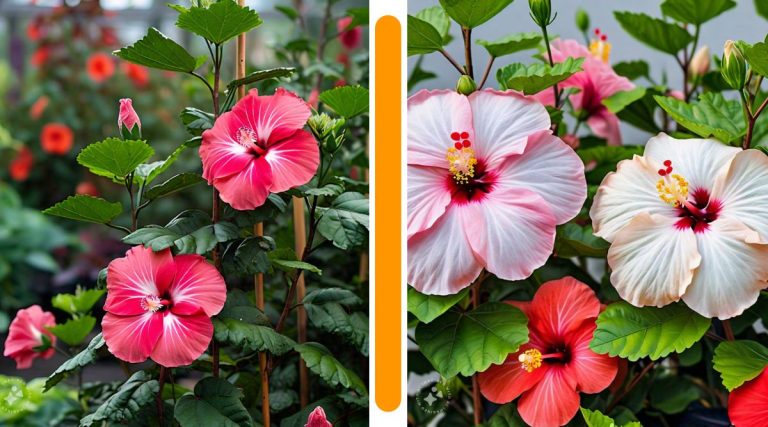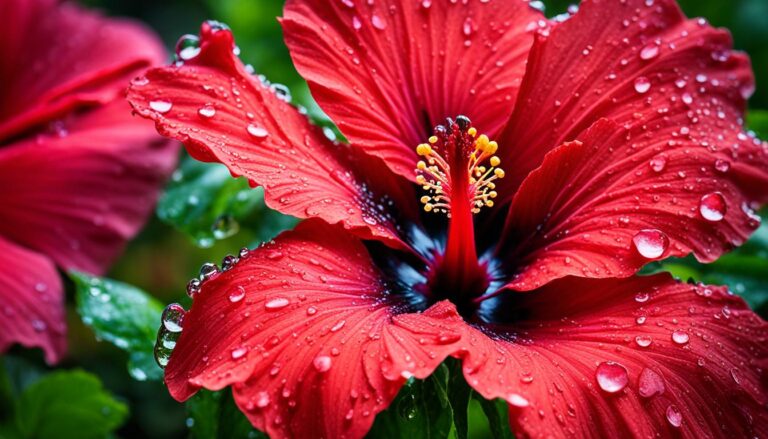Safe Sprays for Hibiscus Bugs – Quick Guide
Finding safe and effective sprays to combat bugs on your hibiscus plants is crucial for maintaining their health and beauty. Nobody understands this better than Rebecca, an avid gardener and proud owner of a stunning hibiscus garden.
Rebecca had spent countless hours nurturing her hibiscus plants, ensuring they received the right amount of sunlight, water, and nutrients. However, she soon noticed an army of tiny invaders attacking her beloved flowers. These pesky bugs were causing damage to the leaves, buds, and even the delicate petals.
Determined to protect her plants, Rebecca began her quest for effective hibiscus bug control. She wanted a solution that not only eradicated the pests but also aligned with her commitment to a natural and eco-friendly approach to gardening.
After conducting extensive research and seeking advice from fellow gardeners, Rebecca discovered some tried-and-true methods to fight hibiscus bugs. Armed with this knowledge, she set out to find the perfect sprays for her precious plants.
Through her exploration, Rebecca unearthed a wealth of information about what to spray on hibiscus for bugs, natural remedies for hibiscus pests, and effective hibiscus insect control. She realized that she wasn’t alone in her quest for a healthy and thriving hibiscus garden.
Now, Rebecca wants to share her findings with fellow hibiscus enthusiasts like you. In this quick guide, we will explore some eco-friendly solutions for hibiscus pest control. Learn what sprays to use and how to spray them for the best results.
Key Takeaways:
- Choosing safe and effective sprays is crucial for hibiscus bug control.
- Look for natural remedies and organic bug spray options for a safer approach.
- Neem oil and insecticidal soaps are effective against common hibiscus pests.
- Make sure to apply the sprays properly to achieve thorough pest control.
- Protect your hibiscus from bugs while keeping the environment in mind.
What’s A Good Insect Spray for Hibiscus?
When it comes to hibiscus pest control, finding a good insect spray is essential. While using a strong stream of water to blast the pests off the plant can be effective, more persistent infestations may require additional measures. Insecticidal soaps and neem oil sprays are excellent choices for effectively controlling common hibiscus pests such as aphids, mealybugs, spider mites, thrips, and whiteflies.
Insecticidal soaps are made from natural, plant-based ingredients and work by suffocating the pests upon contact. They are safe to use on hibiscus plants and pose minimal risk to beneficial insects. Neem oil sprays, derived from the neem tree, have proven effective in controlling a wide range of garden pests. They disrupt the lifecycle of pests, repel them, and even inhibit their feeding.
When choosing a soap or neem oil spray for your hibiscus plants, make sure to select products specifically formulated for hibiscus pest control. This ensures that they are safe and effective for use on these plants.
Benefits of Insecticidal Soaps
Insecticidal soaps offer several benefits for hibiscus pest control. Firstly, they are safe to use around people, pets, and beneficial insects. Unlike many chemical pesticides, insecticidal soaps leave no harmful residues on the plant or in the environment. Additionally, they provide a quick and effective solution by directly targeting the pests. Regular use of insecticidal soaps can help prevent pest infestations and keep your hibiscus plants healthy and vibrant.
Advantages of Neem Oil Sprays
Neem oil sprays have gained popularity among gardeners for their effectiveness and environmentally friendly nature. Besides controlling pests, neem oil is known for its antifungal properties, offering a multifaceted solution for hibiscus care. Neem oil sprays are safe for use on most hibiscus varieties and provide long-lasting pest control. Moreover, neem oil is non-toxic to humans, animals, and beneficial insects, making it an ideal choice for eco-conscious gardeners.
For those who prefer natural alternatives, homemade sprays for hibiscus pest control using ingredients like mild liquid dish soap or essential oils can also be effective. However, it’s important to research and follow proper recipes to ensure their safety and effectiveness.
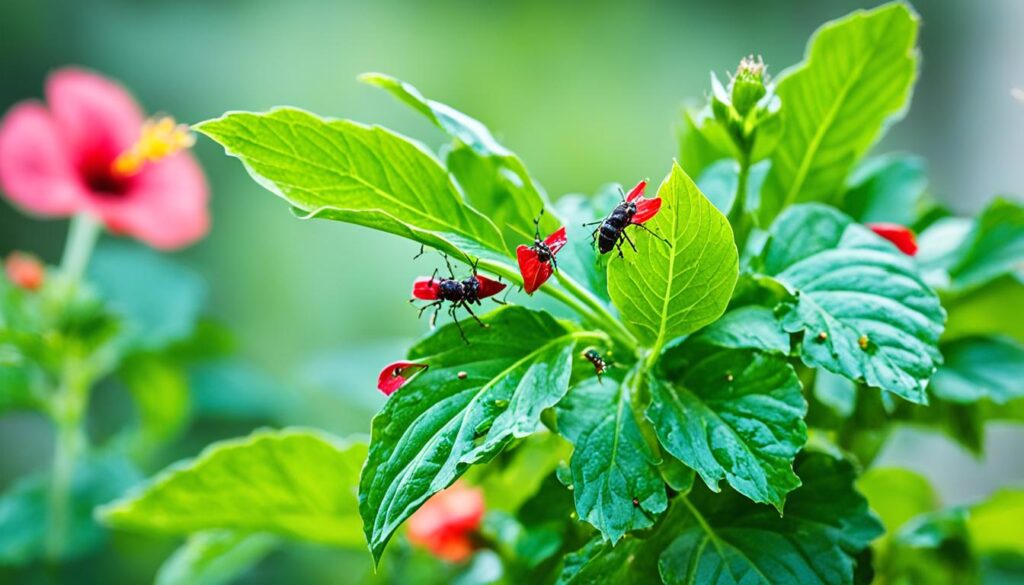
Where Can You Buy Neem Oil or Soap Sprays?
Neem oil and soap sprays for hibiscus pest control can be found at most lawn and garden centers. These stores offer a wide range of hibiscus pest control products to meet your needs. When purchasing neem oil or soap sprays, it’s important to check the label to ensure that they are safe for use on hibiscus plants. Look for products specifically designed for hibiscus or ornamental plants to ensure the best results.
It’s recommended to buy neem oil and soap sprays from reputable brands that have a track record of producing high-quality products. This will help ensure that you are getting a reliable and effective product for your hibiscus pest control needs. Avoid using thick oils such as Malathion, as they may harm the foliage of your hibiscus plants.
When you visit your local lawn and garden center, don’t hesitate to ask their knowledgeable staff for recommendations on specific neem oil or soap sprays for hibiscus pest control. They can provide valuable insights and suggestions based on their expertise and experience.
What About Homemade Sprays for a Hibiscus Plant?
Many organic gardeners prefer homemade sprays for hibiscus pest control. These remedies can be effective and safer for both the plant and the environment. Neem oil, derived from the neem tree’s seeds, is a popular option for managing aphids, whiteflies, mealybugs, and thrips on hibiscus. There are also various DIY recipes available, often using mild liquid dish soap and essential oils like peppermint or rosemary.
| DIY Hibiscus Bug Spray Recipe: |
|---|
| Mix 1 teaspoon of neem oil with 1 teaspoon of mild liquid dish soap, diluted in 1 quart of water. |
| Optional: Add a few drops of peppermint or rosemary essential oil for added effectiveness. |
| Use a spray bottle to apply the mixture to your hibiscus plants, ensuring thorough coverage on both the upper and lower surfaces of the leaves. |
| Apply the spray every 7-14 days or as needed, especially after rainfall or heavy dew. |
DIY sprays are a cost-effective and environmentally friendly alternative to commercial insecticides. By using home ingredients, you have better control over what goes into your hibiscus plants. However, it’s essential to test the spray on a small area before applying it to the entire plant, as some hibiscus varieties may be more sensitive to certain ingredients.
Benefits of Homemade Sprays for Hibiscus Pest Control
- Environmentally friendly: Homemade sprays typically use natural ingredients that are less harmful to beneficial insects and the ecosystem.
- Cost-effective: DIY recipes often utilize items already available in your pantry, saving you money compared to purchasing commercial sprays.
- Craftsmanship: Making your own spray allows you to customize the formula to suit your specific needs and preferences.
- Safety: Homemade sprays tend to be gentler on hibiscus plants and reduce the risk of chemical burns or other adverse effects.
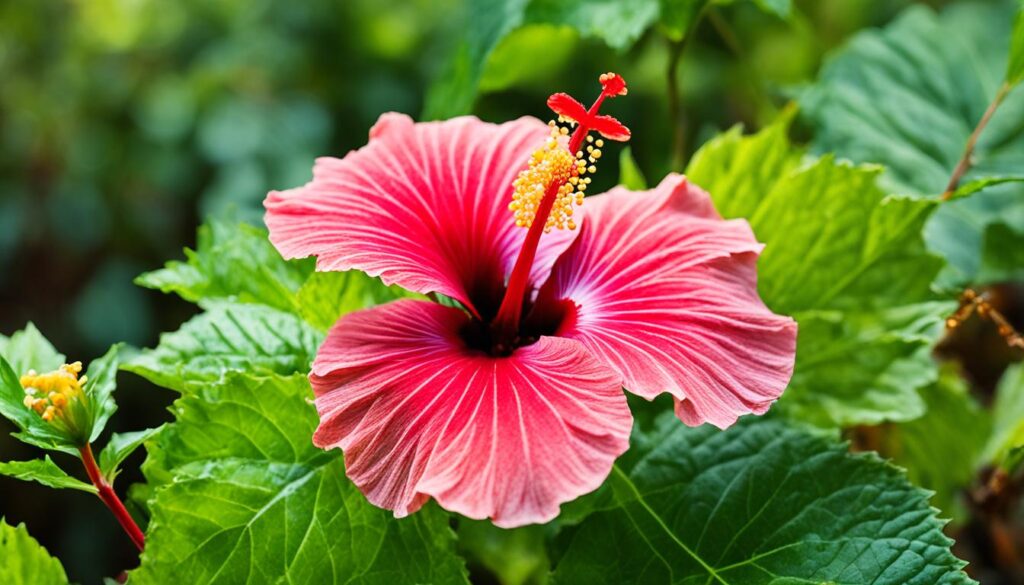
With a homemade spray, you can take pride in actively managing the pests on your hibiscus plants while minimizing the use of harsh chemicals. Remember to always monitor your plants closely after applying any spray and adjust treatment frequency as needed.
What Are The Benefits of Neem Oil and DIY options?
Neem oil and DIY options for hibiscus pest control offer several benefits.
- Effective Pest Elimination: Neem oil is highly effective in eliminating scale insect pests and aphids from hibiscus plants. It targets these pests at various stages of their lifecycle, reducing infestations and preventing further damage.
- Residue-free Solution: Unlike chemical insecticides, neem oil leaves no harmful residues on hibiscus plants. This is important for both the health of your plants and the overall ecosystem of your garden.
- Safety for Beneficial Insects: Neem oil is safe for many beneficial insects, including bees. It specifically targets pests while minimizing harm to beneficial pollinators, helping to maintain a balanced and healthy garden.
- Safer for Your Family: Homemade bug sprays for hibiscus provide a safer alternative for your family. These DIY sprays are free from skin irritants and strong odors, making them safer to use around children and pets.
- Non-toxic to Beneficial Insects: DIY hibiscus bug sprays, when made with safe ingredients, also do not harm beneficial insects. This means you can control pests without disrupting the natural balance of your garden ecosystem.
Overall, neem oil and DIY options offer effective and safe solutions for hibiscus pest control, ensuring the health and beauty of your plants while maintaining a harmonious garden environment.
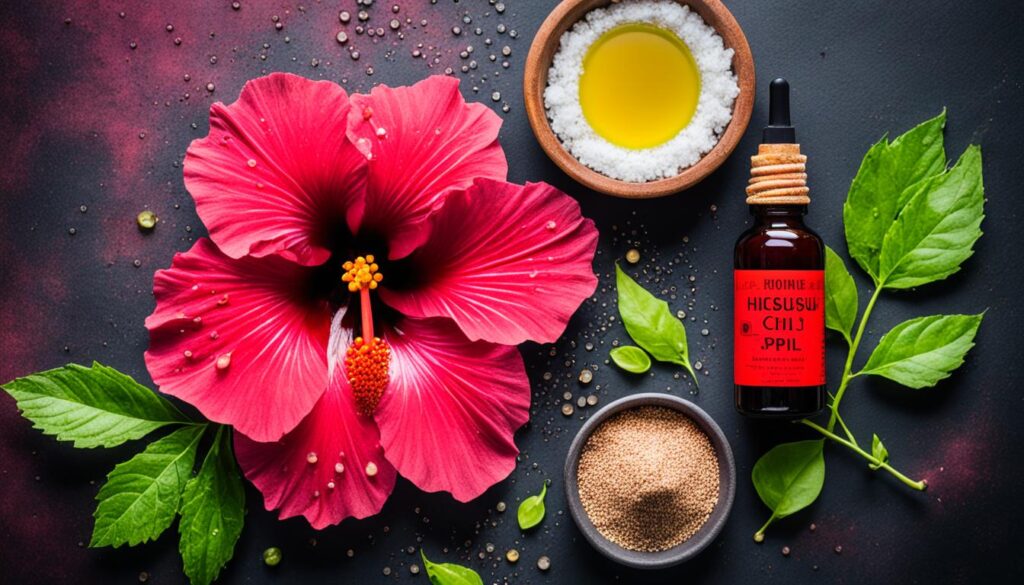
Comparing the Benefits of Neem Oil and DIY Hibiscus Bug Sprays
| Benefits | Neem Oil | DIY Sprays |
|---|---|---|
| Effective Pest Elimination | ✓ | ✓ |
| Residue-free Solution | ✓ | ✓ |
| Safety for Beneficial Insects | ✓ | ✓ |
| Safer for Your Family | ✓ | ✓ |
| Non-toxic to Beneficial Insects | ✓ | ✓ |
What Organic Spray Could I Use?
When it comes to hibiscus pest control, using an organic spray is generally considered the best option. Chemical sprays may effectively eliminate pests, but they can also harm the hibiscus plant and the environment. For a safer and eco-friendly approach, organic sprays like neem oil or homemade recipes are highly recommended.
Neem oil, derived from the neem tree’s seeds, is a popular choice for natural pest control for hibiscus. It effectively manages a variety of pests, including aphids, whiteflies, mealybugs, and thrips. Neem oil works by disrupting the pests’ life cycle, making it difficult for them to reproduce and survive. It’s important to note that neem oil is safe for hibiscus plants and does not leave harmful residues.
Alternatively, you can create your own organic hibiscus bug spray using simple ingredients like mild liquid dish soap and essential oils like peppermint or rosemary. These homemade sprays are not only effective in repelling pests, but they also provide a safer alternative for your family and the environment. Plus, they don’t contain any skin irritants or strong odors that chemical sprays may have.
Eco-Friendly Hibiscus Pest Management
If you prefer to purchase an organic spray, there are various brands available on the market that specifically cater to hibiscus pest management. Look for products labeled as organic hibiscus bug sprays or natural pest control for hibiscus. These sprays are designed to target common hibiscus pests while being gentle on the plants and the environment.
Organic sprays provide an effective and eco-friendly solution for keeping hibiscus bugs at bay without compromising the health of your plants or the planet. Whether you choose neem oil or opt for a homemade recipe, you can rest assured that your hibiscus plants will remain beautiful and pest-free with these safe sprays.
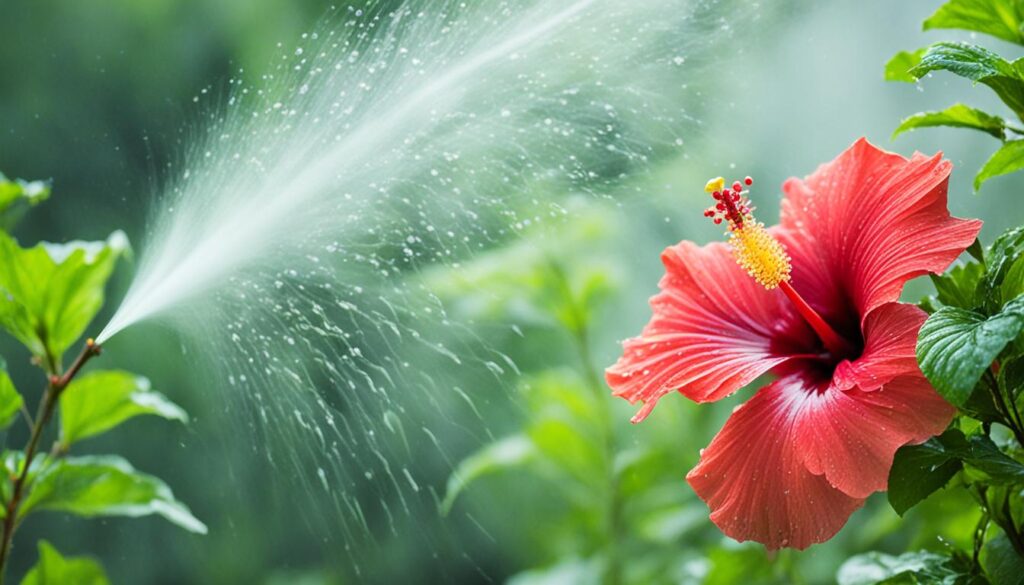
Comparison of Organic Sprays
| Organic Spray | Key features |
|---|---|
| Neem Oil | – Derived from neem tree seeds – Effectively controls aphids, mealybugs, whiteflies, and thrips – Safe for hibiscus plants and beneficial insects – Leaves no harmful residues |
| Homemade Spray | – Made with mild liquid dish soap and essential oils – Repels pests and is safer for the environment – Does not contain skin irritants or strong odors – Offers a customizable solution |
Both neem oil and homemade sprays provide a natural and effective approach to hibiscus pest control. Consider your preferences, the severity of the infestation, and the specific pests you are targeting when choosing the right organic spray for your hibiscus plants.
How Should You Apply Oil Or Soap Sprays?
When it comes to applying oil or soap sprays to your hibiscus plants, following a few guidelines can ensure the best results for pest control.
1. Test a small area first
Before applying the spray to your entire plant, it’s important to test a small area to ensure that the spray doesn’t harm the leaves or flowers. This precautionary step will help you avoid any potential damage to your hibiscus plant.
2. Choose the best time
The best time to apply insecticidal soap or oil sprays to hibiscus plants is early in the morning or late in the evening. Applying the spray during these times helps prevent leaf burn, as the sun’s intensity is lower. It’s also ideal to apply the spray on a calm day to prevent the spray from drifting away.
3. Avoid applying to stressed plants
Never apply sprays to wilted or stressed hibiscus plants. These plants may be sensitive to the spray and could further deteriorate their health. Make sure your hibiscus plants are healthy and well-hydrated before applying the spray.
4. Water the plants beforehand
It’s recommended to water your hibiscus plants thoroughly before applying the oil or soap spray. Moist soil helps the roots better absorb water and nutrients, enhancing the plant’s overall health and resilience against pests.
5. Cover the entire plant
To ensure thorough pest control, it’s important to cover the entire hibiscus plant with the spray, including the undersides of leaves. Pests often hide on the undersides, so thorough coverage will help eliminate them more effectively.
Summary
By following these application tips, you can effectively utilize oil or soap sprays for hibiscus pest control. Remember to test a small area, choose the best time, avoid applying to stressed plants, water your plants beforehand, and cover the entire plant for comprehensive pest management.
Conclusion
Effective hibiscus pest control is crucial for maintaining the health and beauty of your plants. By using safe and eco-friendly sprays like insecticidal soaps and neem oil, you can effectively control common pests and protect your hibiscus. Whether you opt for commercially available sprays or prefer to make your own, it’s important to ensure that they are specifically formulated for hibiscus plants.
Remember to apply the sprays properly and follow the instructions provided to safeguard your plants and beneficial insects. Test a small area first to ensure compatibility, and apply the spray early in the morning or late in the evening to prevent leaf burn. Additionally, avoid applying sprays to stressed or wilted plants and always water your hibiscus thoroughly before treatment.
By following these guidelines and incorporating safe pest control practices, you can create a thriving hibiscus garden that is free from pesky bugs. Whether you choose to buy commercial sprays or explore homemade options, prioritizing the well-being of your plants and the environment is key. Embrace these effective hibiscus pest management techniques and enjoy the full beauty and vibrancy of your hibiscus plants.
